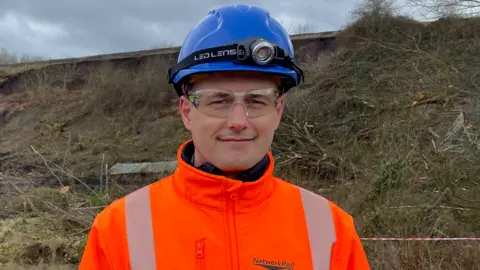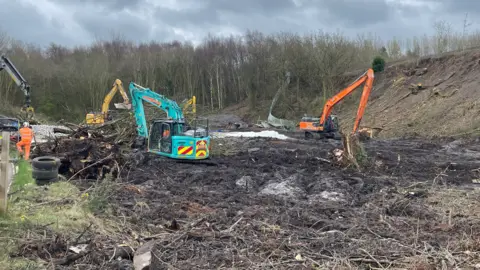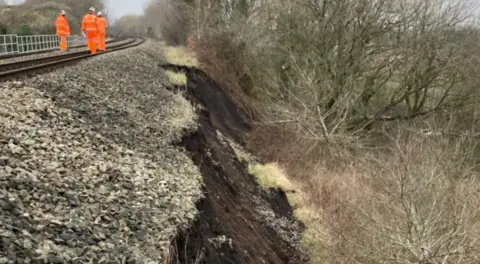Railway line to reopen after embankment repair
 BBC
BBCA railway line which was forced to close after a landslip involving 5,000 tonnes of material is to reopen from Friday.
The collapse, between Wellington and Oakengates in Shropshire, was reported on 8 March.
Adam Checkley, who led the Network Rail repair effort, said it had been a "monumental civil engineering piece of work" to get it repaired in 20 days.
He said it had been the biggest landslip he had encountered in his career.
More than 16,000 tonnes of stone were brought in from a local quarry to rebuild the embankment, which was 160 years old.
Mr Checkley examined documents from the time which showed how it had been constructed originally and said: "Effectively it was people putting mud on top of mud on top of mud."
This time, Network Rail built up the 50m (164ft) length of embankment on steps of stone, up to a height of 20m (66ft).
Barring some tidying up work on the site, the work was complete, Mr Checkley said.
Trains will have to run slightly slower than usual over the embankment for a week, to let everything settle but a full service will be restored from Friday.

Normally Mr Checkley said an operation of this scale could take years to plan and up to 16 weeks to carry out but they were under pressure to get the line open again as quickly as possible.
The closure meant no trains were able to run between Shrewsbury and Telford, although a limited service between Telford and Wolverhampton was restored before the work was complete.
Mr Checkley said: "It really was a race against time, because we knew the Easter holidays were among us and we knew the longer we left it, the more that embankment may slip even further."
 Network Rail
Network RailThe land slippage was caused by "an incredibly wet winter" Mr Checkley said and he added: "I suspect it's all part of global warming, it's all part of the way in which our weather is changing."
With that in mind, he said Network Rail was working to improve the resilience of its embankments and work on ways to respond quicker to slippages and predict where they might happen.
But he said this landslip would not be the last.
Follow BBC West Midlands on Facebook, X and Instagram. Send your story ideas to: [email protected]
